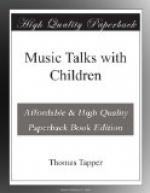To one who does not think deeply, it might seem that if any study in school is merely ornamental, that study is music. He might say that all the other studies tend to some practical end in life and business: that one could not add, nor read, nor transact business, nor write a letter any more correctly by knowing music. It is only an unthinking person—none other—who would say that.
Of the usefulness of all the school studies we have spoken. We need only to take a few steps along the pleasant road, about which we have had so many Talks, and we shall see how much music means in life. To us it is already plain. Music is a new world, to enter which cultivates new senses, teaches us to love the beautiful, and makes us watchful of two of the most important things in life: the thoughts and the heart. We must have exact thoughts or the music is not made aright, and the heart may be what it will, music tells all about it. Therefore, let it be good.
But music in school brings us to daily tasks in tone. What do we learn? After the difficulties of reading the notes and making the voice responsive are somewhat overcome, we study for greater power in both, the one-, two-, or three-part exercises and songs; the exercises for skill and the songs to apply the skill, and make us acquainted with the music of great masters.
In one Talk, one of the first, we spoke of the major scale. It has eight tones only, and though it has existed for many hundreds of years, no one has yet dreamed of all the wonderful tone-pictures which are contained in it. It is out of it that all the great composers have written their works, and for centuries to come men will find in it beauties great, and pure, and lasting.
As we sing in school, we are learning to put the major scale to some use. It calls upon us in the melodies which it expresses, to be careful that each tone shall be right in length, in pitch, in loudness, in place. We must sing exactly with the others, not offensively loud, nor so softly as to be of no service. And this demands precision of us; and precision demands thought. And if we are singing to gain a better use of voice we must, in every sound we make, have our thoughts exactly upon what we are doing. This is Concentration. If, on the other hand, we are trying our skill on a song, we shall have, in addition, to be careful to give the right expression, to sing not only the tones clearly, but the words, to feel the true sentiment both of the poem and of the music, and to express from our hearts as much of the meaning of poet and composer as we understand. All these things are more particularly required of us if we are singing in parts. The melody must be properly sustained and must not cover the under parts; while the under parts themselves should never intrude upon the melody, nor fail to be a good background for it. The singing of part music is one of the best ways to train the attention—that is, to get Concentration. As we sing our part we must have in mind these things:




